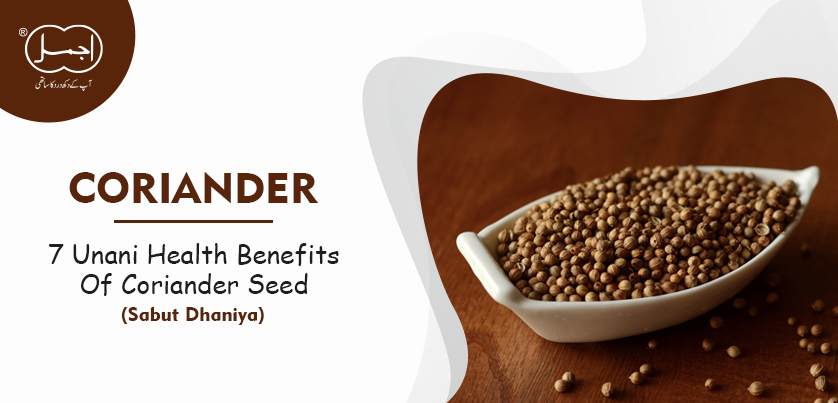CORIANDER
Coriander, a plant, you know very well. The most commonly used Asian spice is known as dhaniya there. Well, one can’t imagine the health benefits of this economical and on-hand herb. All the parts of dhaniya have various nutritional and health benefits and are edible. Do you want to know the Unani health benefits of dhaniya seed (sabut dhaniya)? Isn’t that amazing! Let me tell you how 1. So, stay tuned with us.
A Brief Overview of Coriander
The green leafy dhaniya (hara dhaniya) is globally called cilantro. Indeed, you can say both are two names of the same thing. Dhaniya is used in curry, soup, and every other meal over the table as a garnisher. Indeed, most people around us don’t know the treasure of this humble herb’s benefits.
After the Dhaniya leaves, here comes coriander seed. Thus, these are called sabut dhaniya. It can also be available in coriander powder (dhaniya powder).
The sweet smell that Dhaniya gives is second to none, and the taste it adds is just delightful.
In common words, let’s discuss the health benefits, side effects, and doses of this mesmerizing herb named Dhaniya.
Pharmacognosy of Coriander
Botanical Origin
Coriandrum sativum
Family
Umbelliferae
Part Used
Each part of the coriander plant can be used for medicinal purposes. Yet, dried ripe fruit has a vital role in therapeutic effects.
Habit
Herb
Synonyms
Chinese parsley is another common name for Dhaniya.
Habitat
It is cultivated in central and eastern Europe, particularly Russia and Africa.
Collection
The plant is cut down with sickles; the fruits are collected and dried. During drying, fruits develop an aromatic smell, and the unpleasant odour disappears.
Characteristics
The fruit is a cremocarp, subspherical in shape, Yellowish-brown in colour. The size of the fruit is 3 to 4 mm in diameter, with an aromatic odour and spicy, aromatic taste.
Constituents
Dhaniya consists of about 1% of volatile oil. The chief volatile components are D-(+)-linalool (coriandrol), along with constituents like borneol, p-cymene, camphor, geraniol, limonene, and alpha-pinenes. The fruits also contain fatty oil and hydroxycoumarins. The fatty oils include acids of petroselic acid, oleic acid, linolenic acid, whereas the hydroxycoumarins include the umbelliferone and scopoletine.
Medicinal Uses
Dhaniya is used as a flavoring agent. Moroever, it is used as a stimulant and a carminative The oil is employed as an expectorant and as an appetizer. It is also utilized as aromatic. Therapeutically, it is used as a diaphoretic. The oil is externally applied for the treatment of rheumatism. It is used to treat diarrhea, digestive upsets, anorexia, and flatulence in children
FAQ
Are coriander and cilantro the same thing?
Dhaniya and cilantro come from the same plant, i.e., Coriandrum sativum. Dhaniya is the whole plant or plant’s seed, while cilantro comes from the plant’s fresh leaves.
How to make coriander powder at home?
If you’ve whole dried seeds, ground the seeds when needed. To make a perfect coriander powder at home. Roast Dhaniya seed (Sabut dhaniya) without oil to enhance the aroma. Then, grind it in an electric grinder or mortar or pestle.
Tip: You may not store the grounded sabut Dhaniya for a longer time. Thus, grind it when you need it. You can crush the coriander coarsely or refinedly according to your recipe.
Are Dhaniya and parsley the same?
Dhaniya and parsley are two different herbs, but their mode of action on the body is similar. Parsley has a very vegetal, herb-like flavor that reminds you vaguely of mint without the menthol. In contrast, Dhaniya has a citrus or lemongrass flavor, crossed with a herb flavor. However, Dhaniya has a stronger flavour than parsley. Yet both can be dried in the same form.
How to store sabut dhaniya?
Generally, the sabut dhaniya is stored in an opaque air-tight container, in a cool and dry place. Sabut dhaniya powder can be stored for four to six months.
Tip: You can store it with asafoetida in the same container to prevent any spoilage.
One additional tip; take coriander with asafoetida and rock salt; it will improve your digestion.
How does coriander (sabut dhaniya) help in weight loss?
Dhaniya has cardinal health benefits for the human body. Dhaniya works as a detoxifying agent that cleanses the liver, kidney, and pancreas. Basically, it would help if you took a hand full of Dhaniya and parsley with a cup of water. Make it into your daily diet and see evident changes in your body.
Additional tip: Soak about ten to twenty Dhaniya leaves in water overnight. Drink the strained water the very next day on an empty stomach. To make it palatable, add a few drops of lemon juice. Another recipe, take fresh Dhaniya leaves. Wash the leaves and grind them in the blender. Now, take lukewarm water, and add a tablespoon of lemon juice and honey. Consume the mixture on an empty stomach.
How does coriander help kidneys?
Coriander (dhaniya) works as an antioxidant and detoxifying agent. Essentially, it is a natural killer to cleanse the kidney. Thus, the purification treats urinary disorders, chronic stomach pain, fever, nausea, and vomiting.
How does coriander seed help in the thyroid?
Dhaniya seed water is beneficial for treating any deficiency of the thyroid. Take a glass daily for eight days, and you will feel the fruitful change in your body.
Unani Health Benefits of Coriander
Let’s discuss the holistic benefits of coriander. We’ve marked some of the benefits of coriander in Unani light.
one should follow the dose for the intake. However, its dose depends on many factors like:
- How old are you?
- For which reason you’re using it?
- Medical history
- One should take any Unani product from coriander (dhniya) extract with healthcare assistance.
Conclusion
Coriander is a natural herb that’s available everywhere around the globe. Most people use it without knowing the actual good done by it to their health. Coriander is either available in coriander leaves (hara dhaniya) or coriander seed (sabut dhaniya).
The seeds and the coriander leaves are used for various purposes as both are full of health welfare. They take part in the immunity development of a person, but they also help maintain the health of visceral organs like the heart, brain, stomach, and kidneys. Always check your allergies before taking any herb.
- Why you should eat coriander leaves everyday in winters
- Why you should eat coriander leaves everyday in winters (2018). Available at: https://recipes.timesofindia.com/articles/food-facts/why-you-should-eat-coriander-leaves-everyday-in-winters/photostory/67216529.cms
- 8 Surprising Health Benefits of Coriander (2022). Available at: https://www.healthline.com/nutrition/coriander-benefits#2.-Rich-in-immune-boosting-antioxidants
- You will be surprised to know these Health Benefits of Coriander (2022). Available at: https://www.allthatgrows.in/blogs/posts/health-benefits-of-coriander
- Coriander: Uses, Side Effects, Dose, Health Benefits, Precautions & Warnings
- Coriander: Uses, Side Effects, Dose, Health Benefits, Precautions & Warnings (2022). Available at: https://www.emedicinehealth.com/coriander/vitamins-supplements.htm




